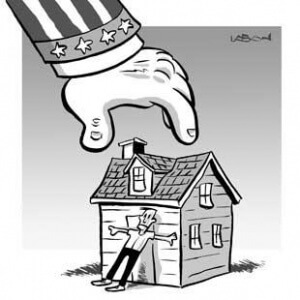The Heavy Burden of Eminent Domain

In theory, eminent domain is the inherent power of the government to “take” private property for “public use.” When the government elects to exercise this power, the Constitution requires that “just compensation” be paid to the property owner in exchange for the taking. Based on this theory, it is easy to observe that the individual property owner bears a significant burden when the government uses eminent domain. After all, this process is totally involuntary and requires the property owner to participate in a condemnation procedure that may seem confusing without the guidance of experienced counsel. Unfortunately, the “cloud of condemnation” also compels many uninformed property owners to sell their property to the government for a depressed value below “just compensation” due to the pressure of the impending taking, or it may make it difficult for the owner to sell, lease or even use the property.
In addition to the burden that directly falls upon the property owner, the Fifth Amendment’s guarantee of just compensation in eminent domain cases was designed to bar the government from forcing some individuals to bear burdens that, in all fairness, should be borne by the public as a whole. Armstrong v. United States, 364 U.S. 40, 49 (1960) (emphasis added). When one person is asked to assume more than a “fair share” of the public burden, the payment of just compensation operates to redistribute that economic cost from the individual to the public at large. See United States v. Willow River Co., 324 U.S. 499, 502 (1945); Monongahela Navigation Co. v. United States, 148 U.S. 312, 325 (1893). Therefore, the Constitution, and Supreme Court case law interpreting the same, demand that the cost of a governmental taking should be assumed by the public as a whole, especially since the property in question was taken for the public’s benefit (i.e., for “public use”).
In any event, the eminent domain process involves the exercise of one of the most awesome powers of government. City of Atlantic City v. Cynwyd Inv., 148 N.J. 55, 73 (1997). A condemnor must be mindful of its obligation to deal forthrightly and fairly with property owners subject to an involuntary taking of their property. See State, by Comm’r of Transp. v. D’Onofrio, 235 N.J. Super. 348, 353 (Law Div. 1989) (“It must be remembered that the power to take property through eminent domain is one of the most intrusive aspects of sovereignty. Historically, land has been both the basis and symbol of wealth and still occupies a special place in our law. Real estate is also frequently irreplaceable because of its uniqueness. Thus, the state should not be heard to complain when the property owner seeks the fullest vindication of the rights of ownership.”)
Our firm understands that the taking of private property has lasting and serious consequences for property owners. For over 55 years, McKirdy, Riskin, Olson & DellaPelle, P.C. has concentrated its practice in this special area of the law and has earned a reputation for persistently defending its clients’ property rights. Our firm has successfully handled a broad range of eminent domain cases involving almost every type of property, including commercial buildings, industrial properties, development land, single and multi-family residential properties, hotels/casinos, oil/ gas pipelines, water rights and beachfront property, airports, farmland, and many more. If you are confronted with the threat of eminent domain, please feel free to contact us for a free consultation.







